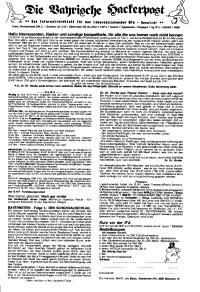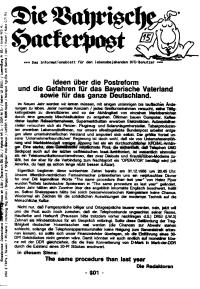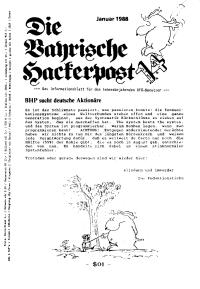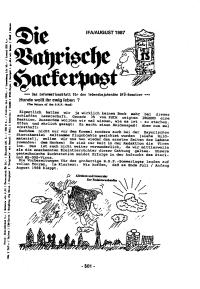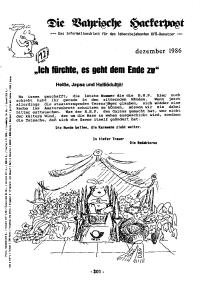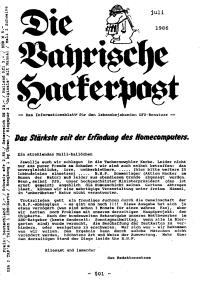Copy Link
Add to Bookmark
Report
Inklings Issue 6.19

****************************************************************
i n k l i n g s
Inkspot's newsletter for Writers on the Net
http://www.inkspot.com
Issue 6.19 September 27, 2000
*****************************************************************
<http://www.inkspot.com/inklings/issues/ink0619.html>
SPECIAL ISSUE: In this issue we present the results to our "all
rights" survey of August 30, plus tips on where to find more
information about rights online.
This issue sponsored by:
*****************************************************************
XLIBRIS exists to help authors publish. Promptly, permanently.
You retain control. We make it happen: your book in beautiful
hard cover and trade paperback editions, available on-demand,
forever. Call for a free information pack: 1-888-7XLIBRIS, e-mail
info@xlibris.com or visit us online: http://www.xlibris.com/
*****************************************************************
ISSN 1205-6413. Copyright (c) 2000 Inkspot Company Of Canada.
See end of issue for full copyright and contact information.
*****************************************************************
CONTENTS THIS ISSUE:
From the Managing Editor's Desk
Fresh Ink/Book Giveaway
Market Information
"Selling All Rights: Right or Wrong?" by Moira Allen
Inkspot Community Chat Update
Writers' Classifieds
*****************************************************************
FROM THE MANAGING EDITOR'S DESK
-------------------------------
Our Survey Results Are In...
----------------------------
Our feature article this issue presents the results of our "all
rights survey" -- along with Inklings' decision about featuring
listings for markets that demand all rights. Read on for what
Inklings readers have to say, then visit our "poll results page"
at http://www.inkspot.com/feature/survey2.html for a complete
list of survey responses.
Have You Taken the Plunge?
--------------------------
Have you made the jump from "employed" to "full-time freelancer"?
If so, I'd like to hear from you -- and hear your tips on how to
make this type of transition a success. Please drop me a line at
moira@inkspot.com with your tips, success stories, and warnings.
-- Moira Allen
*****************************************************************
Looking for online discussion with other writers? Check out
Inkspot's discussion forum community! Wide range of topics for
writers of all ages.
Forum Topics: http://www.inkspot.com/forums/topics.html
Community Events Calendar: http://www.inkspot.com/events
*****************************************************************
FRESH INK
---------
New on Inkspot:
---------------
If you've had trouble subscribing to THE TRAVELWRITER, don't
despair; the system should be working now. To subscribe to this
monthly e-mail update from The Travel Writer's Spot, send an
e-mail to kennerly@inkspot.com with "subscribe" in the subject
line, or visit:
http://www.inkspot.com/genres/travel/
The SELF-PUBLISHING CENTER introduces "Afterword," a new column
of essays, interviews and success stories from self-published
authors. The column kicks off with "Simple Steps to a
Successful Book," by Jim Donovan.
http://www.inkspot.com/selfpub/afterword/donovan.html
The TRAVEL WRITER'S SPOT introduces "Success Stories." Every
travel writer started somehow, somewhere; this week, the Spot
interviews Yvette Cardozo and Bill Hirsch, a husband/wife
travel-writing and photography team.
http://www.inkspot.com/genres/travel/success/
The GENRE WRITING PAGE will now feature regular updates and
announcements regarding the different fiction and nonfiction
genre sections. Check back often:
http://www.inkspot.com/genres
**-----------------------------------------------------**
New Articles on Inkspot:
------------------------
BUILDING A SUCCESSFUL COMPILATION
by Brandon Trissler
Tips on creating and publishing a collective work.
http://www.inkspot.com/selfpub/articles/compilation.html
CONVENTION AND VISITORS' BUREAUS: HOW THEY CAN HELP YOU
by Gil Stotler
New on The Travel Writer's Spot - How CVBs can help a visiting
travel writer make connections and get the story.
http://www.inkspot.com/genres/travel/articles/cvb.html
FICTION TECHNIQUES, PART III: HANDLING A CAST OF THOUSANDS
by Will Greenway
Our "fiction techniques" series continues with a look at how to
handle multiple characters and make each distinct (without letting
cameos take over your story!).
http://www.inkspot.com/feature/greenway3.html
FREE E-BOOKS?
by Angela Giles Klocke
Why would you write a book just to give it away? You might be
surprised at the answer!
http://www.inkspot.com/feature/klocke.html
PLOT IS YOUR ENEMY
by Ben Brown
New on The Fictioneer: How authors can get sidetracked by
worrying too much about plot -- and how to loosen up about what
you write and how you write it.
http://www.inkspot.com/fiction/articles/enemyplot.html
USING YOUR SIXTH SENSE (AND ALL THE OTHERS)
by Tal Whitefang
Wake up your fiction by waking up your senses (and those of your
readers)!
http://www.inkspot.com/feature/sense.html
**-----------------------------------------------------**
Prize Giveaway: Reclaiming the Magic -
A Writer's Guide to Success
---------------------------------------
by Lorna Tedder (Spilled Candy)
It's back! A temporary page glitch kept readers from entering
this contest on Inkprints, but we've resolved the problem. The
new deadline is September 30, 2000. For details on how to enter,
see the Writer's Challenge board at INKPRINTS:
http://www.inkspot.com/books/inkprints.html
Congratulations to:
-------------------
Karen Pike Davis -- winner of James Russell's "Stage and Screen
Marketing Secrets"
Maggie Ball and "editrix" (a tie) -- winners of Noah Lukeman's
"The First Five Pages"
** If you have a writing-related book you would like to
be considered for review and/or giveaway, please contact Bev at
bev@inkspot.com. The BookStop: http://www.inkspot.com/books/
**-----------------------------------------------------**
3rd Millenium Pros Webring
--------------------------
Locate e-publishers and e-authors through the ring!
http://www.webring.org/cgi-bin/webring?ring=21st;list
NetAuthor
---------
An "on-line resource for writers" hosted by Robert Marcom,
offering articles, interviews, the "E2K Journal," and links.
http://www.netauthor.org
Poetic Terms, Figures of Speech, and Sound Devices
--------------------------------------------------
An interesting dictionary of poetic terms.
http://www.chebucto.ns.ca/~greebie/Criticism/glossary.html
Prolific Authors
----------------
A new critique group for writers of short speculative fiction.
"This is for those who need a kick in the pants to produce."
Members must submit one story and three critiques every two
weeks. To subscribe, e-mail prolific_authors-subscribe@topica.com.
http://www.topica.com/lists/prolific_authors
Sulekha.com
-----------
A website geared for the East Indian community and a showcase for
emerging authors, this site also discusses issues that plague
new writers and issues that affect South Asian writers (such as
"weaving ethnicity/foreign words into English works").
http://www.sulekha.com/
The Writing Desk - A New Column by Moira Allen
-----------------------------------------------
The Writing Desk is a new, weekly Q&A; column covering a host of
writing and publishing topics. This week: Tips on "taking the
plunge" into full-time freelancing. Free subscription!
http://www.themestream.com/articles/187028.html
** Please send suggestions for Fresh Ink to freshink@inkspot.com
*****************************************************************
MARKET INFORMATION
------------------
Please get current, detailed guidelines before submitting to
publications if possible. Don't submit to email addresses unless
specifically stated. Include a SASE for surface mail replies.
More market info at: http://www.inkspot.com/market/.
**-----------------------------------------------------**
"FNASR": First North American Serial Rights, "SASE":
self-addressed, stamped envelope, "simsubs": simultaneous
submissions, "mss": manuscript, "RT": response time, "GL":
guidelines, "cc": contributors' copies.
Markets Editor: Sal Towse (ST). Research assistants: Shane Stacks
(SS), Margaret Shauers (MS), Jan Edwards (JE), Jerri Ledford
(JL).
**-----------------------------------------------------**
CAT FANCY
Editor: Amanda J. Luke
P. O. Box 6050, Mission Viejo, CA 92690
CAT FANCY is a magazine directed to the general cat-owning
population, dedicated to improving the lives of cats worldwide.
Covers the care, enjoyment and responsible ownership of cats.
FREQ: Monthly. CIRC: 325,000. NEEDS: Informative articles dealing
with feline health, nutrition, grooming, behavior and training;
lifestyle articles, features on cat-related events, hobbies or
crafts. Well-researched medical and behavior pieces from
freelancers may be considered if experts are consulted. Articles
of fewer than 1,000 words are occasionally accepted for the "Cat
Newsline" department. These articles cover news items of national
interest to cat lovers, such as new legislation, medical
breakthroughs and trends in cat care. The "Kids for Cats" section
uses short stories, how-to pieces, word puzzles, quizzes and craft
projects for readers between the ages of 8 and 15 years old.
LENGTH: 850-1,200 word articles accompanied by high-quality color
slides or photographs. RTS: FNASR on an exclusive basis;
nonexclusive rights to use the article in electronic media;
nonexclusive rights to use articles, name of author, image and
bio in advertising and promotion. PAYMENT: On publication. Article
fees are based on the quality of the article and the writer's
experience ($400-$500). RT: 8-10 weeks on query letters. SAMPLE
COPIES: Not available. Past issues are available at libraries,
pet stores, bookstores, or other newsstands. COMMENTS:
Comprehensive Writer's GL, Photographer's GL, and Artist's GL
are available online. SUBMISSIONS: Cat Fancy does not read or
accept unsolicited mss. Submit article queries by mail only
with a SASE. Include published writing samples and resume if
possible. Query letters should offer well-focused idea,
descriptive information about how topic will be pursued, and a
preliminary idea of who sources will be. Background information
and writing credentials are helpful as well. If a query is
accepted, articles are submitted on spec. (JE)
URL: http://www.animalnetwork.com/cats/
GL: http://www.animalnetwork.com/cats/guide.asp
**-----------------------------------------------------**
VIRGINIA ADVERSARIA
Editor: Bill Glose (stories); Assistant Editor: Vinnie Pedula
(articles); Poetry Editor: Nancy Powell
P.O. Box 2349, Poquoson, VA 23662
VIRGINIA ADVERSARIA "accepts submissions of fiction, nonfiction,
and poetry. Fiction and poetry are open to any genre, as long as
the piece is tasteful (i.e. not sexually graphic or extremely
profane). Nonfiction themes vary from anecdotes and true stories
related to life in Virginia to any subject of interest to
Virginia residents. We feature primarily Virginian authors, but
are open to all submissions. Pieces have been accepted from
Canada, Hawaii, California, and North Carolina. To best
understand what we are looking for, read the journal first."
FREQ: Quarterly. CIRC: 2,000+. LENGTH: 6,000 wds max. "Vignettes
(500-1,500 wds) may be submitted for the Reflections column."
GL: Submit via either postal or e-mail. For postal, use standard
ms format. For e-mail, send submission in body of e-mail (followed
by the words "The End"). Please note that *no* attachments are
accepted via e-mail. Simsubs, multisubs, and previously published
material all accepted. RIGHTS: One Time Print. PAYS: $.01/wd, up
to $60, and one cc. Pays on publication. RT: 2-5 weeks. TIPS:
"Reread and polish your work before submitting. If you find
your story lacking when you read through it, chances are we
will too. We are looking for submissions that excite you, and
in turn, excite us. Virginia Adversaria is dedicated to helping
new authors and replies with criticism whenever appropriate and
time permits. Beginning writers have had the most success writing
personal vignettes drawing from their life experiences." SAMPLE
COPY: $4.95. (SS)
E-mail/GL: empirepub@hotmail.com
**-----------------------------------------------------**
CHRONICLE OF THE OLD WEST
Editor: Sunny Livesay
P.O. Box 2859, Show Low, AZ 85902; (520) 532-2875
CHRONICLE OF THE OLD WEST is a monthly newspaper for Old West
enthusiasts. FORMAT: "Newsprint tabloid in the style of a vintage
Old West newspaper." NEEDS: True, unique Old West stories.
"Articles can be one-time, a series of related articles or a
continuing saga." LENGTH: 400-2,000 wds. GL: Submit in standard
ms format (Times or Arial font), include sources and additional
information at end of ms. Submissions also accepted via e-mail or
on IBM-compatible disk. Previously published material considered
if original publication information is provided. No simsubs
accepted. NOTE: "When we buy a manuscript, we reserve the right
to edit, rewrite and shorten it." RIGHTS: FNASR. PAYS: $.03-$.05/
wd, plus 2 cc's. Pays within 30 days of publication. RT: 3
months. TIPS: "We are looking for articles that educate,
entertain and excite people about the Old West. The articles
should be historically accurate. Real flavor and atmosphere of
the Old West is encouraged over technical or dry scholarly
accounts. We want to give the reader the feeling he or she is at
the time and location of the subject of the article. Possibly
the event just took place and the writer was there. We want the
Old West to come to life for the reader. Subjects can include
adventure or daily life, covering outlaws and lawmen, ranchers
and farmers, trappers and settlers, Native Americans and cavalry,
wildlife and livestock. Photos, maps and art are encouraged and
may sway a decision. Artwork can be black and white, color slides
or archival material. Private photos are especially valued.
Submit photocopies with query." (SS)
E-mail/GL: Sunny@RavenHeart.com
**-----------------------------------------------------**
MARKET UPDATES: Dan Knestaut, editor of bovine free wyoming!
(INKLINGS Issue 6.4, Mar.1st/2000), tells us they've moved to
http://www.bovinefree.webprovider.com. Guidelines can be found
at http://www.bovinefree.webprovider.com/submit.html. bovine
free wyoming! is "a somewhat quarterly e-zine of literature,
photography, art and whatever else we felt deserved posting."
Pay is $5 per piece within 30 days of acceptance for "one time"
North American rights (if in the future they decide they'd like
to include your work in an anthology, they'll ask permission).
More on Chatelaine... A Canadian reader replies to last issue's
note about Chatelaine: "This is in response to the reader who
noted that Chatelaine wants a Canadian woman's perspective.
Women's health care stories are NOT necessarily universal. We
have a different health care system here in Canada than in the
United States. Also, as a Canadian who gets frustrated by the
terrible mail service between Canada and the U.S., shoot me, but
I have to applaud Chatelaine for giving Canadian writers first
dibs on a Canadian publication."
Troika: Last week, a concerned reader sent along a "Just curious
to know what you think about this... " with a pointer to the
Writer's Network section of Troikamagazine.com's web site where
(for a $100 submission fee) Troika auctions off writers'
manuscripts and screenplays. We've reconfirmed with Eric Meadow,
Editor of Troika, that submitting to their magazine (a market we
covered last issue) does not require a submission fee. The
Writer's Network portion of the site was not covered in our
market reports section, which never covers markets or contests
that require entry or submission fees. (ST)
Please send market news to Sal Towse, towse@inkspot.com.
*****************************************************************
Ask the Experts
---------------
*** Please put "Inklings question" in the subject header. ***
Judith Bowen (ROMANCE WRITER) judith@judithbowen.com
David Breeden (POET) dbreeden@schreiner.edu
Charles Deemer (SCREENWRITER) charlesd@inkspot.com
Mark Fowler (LAWYER) askthelawyer@inkspot.com
Ginger Knowlton (AGENT) agent@inkspot.com
Michelle West (SF/FANTASY WRITER) Michelle.Sagara@sff.net
Lee Wardlaw (CHILDREN'S BOOK WRITER) lee@inkspot.com
Marcia Yudkin (FREELANCE WRITER) yudkin@inkspot.com
Columnists may be unable to reply privately to every message,
but will answer selected questions in future issues of Inklings.
Please keep your question BRIEF and send it to *one* columnist.
NOTE: Because of the length of our feature article, there is no
"Ask the Experts" column in this issue. Our next issue will
feature a column by Children's Book Writer Lee Wardlaw.
*****************************************************************
SELLING ALL RIGHTS: RIGHT OR WRONG?
AN INKSPOT READER SURVEY REPORT
-----------------------------------------------------------------
by Moira Allen <moira@inkspot.com>
In the August 30 issue of Inklings, we asked: "Should writers
sell all rights?" The question was two-fold -- whether selling
all rights was justified, and whether Inklings should list
markets that demand all rights.
More than 175 readers responded, with answers that demonstrated
just how complex this issue is. (For a complete list of answers,
visit http://www.inkspot.com/feature/survey2.html.) The majority
(52.5%) felt that Inklings should not list such markets, and most
of these readers stated that writers should never sell all rights.
Another 27.6% believed we should list such markets (though with
caveats), while 19.7% had mixed reactions, offering interesting
and compelling arguments in favor of selling all rights.
Selling All Rights: What Does It Mean?
--------------------------------------
Some respondents were confused by the meaning of "all rights."
To understand the question, therefore, it's important to know
exactly what selling all rights means.
When you write a story, article, or other work, you automatically
hold the copyright to that piece. You do not need to register
your copyright to "own" it (though this can be important if you
must prove a copyright infringement). With that copyright comes
a body of "rights" (or "uses") that you can license or sell to
others. For example, you can license "First North American
Serial Rights" to one publication, first electronic rights to
another, First British Rights to a third, First Japanese World
Language Rights to a fourth -- and so on. (For a more detailed
description of the types of rights you can sell, see "Rights:
What They Mean and Why They're Important," by Marg Gilks, at
http://www.inkspot.com/feature/rights.html.) You can sell the
piece as a reprint, to an anthology, or even sell the movie
rights.
If you sell all rights, however, you lose the ability to resell
that material to any other publisher, ever. You can't sell it
as a reprint, or to other countries, or even post it online on
your own website. The publisher, however, can reprint or resell
it at will -- without paying you another penny.
What you do NOT lose is your copyright. You are still the
author, and the publisher does not have the right to claim
authorship, publish the piece under another byline, or
substantially alter (or change the meaning of) the material. All
you have sold are the rights to that specific form of expression.
This is what sets "all rights" apart from "work for hire," where
you lose not only your rights to a piece but the copyright as
well. (When a piece is sold as "work-for-hire," you transfer
copyright to the buyer, who becomes both owner and "author" of
the piece.)
With so much to lose, is there any reason in the world to do such
a thing?
"Never!"
--------
"Giving all rights to a publisher is like trusting an alligator
not to eat you," said one reader. "It is just a legal way of
'stealing' material from the original author," wrote another.
"Such a policy shows a fundamental lack of respect for the people
who create the work which sells their magazines," noted a third.
New writers can be particularly vulnerable to demands for all
rights. "Publications that demand all rights... constitute a
high risk to less experienced (or less confident) writers, who
may believe they have no choice but to give up the rights to
their work if they want to be published," said one reader.
"When you're new to the publishing industry, you don't understand
how the things you do early on are going to affect you later,
when you become more savvy and have more control of your career,"
noted another. "One never knows when one may elect to re-use an
article or some other piece of creativity, and giving up
everything seems like a bad move," another agreed.
Several recounted their own experiences and regrets. Theresa K.
wrote, "I sold all rights to my first book because I was desperate
to be published. The publishers did a wonderful job, the book
looked great, but it was like giving a child up for adoption.
Since its publication, the book has been reprinted several times
and has sold about 50,000 copies; it is now packaged with a CD.
Could I have sold it to another publisher? I don't know. Would I
do it again? No, but I'm not as desperate now as I was then.
Getting your foot in the door is hard. I don't regret my decision
but I will always wish I could have retained an interest in
something that was so much a part of me."
Cynthia M. had a similar tale: "There is a publisher in [my]
city that produces educational testing material for school-age
children. They pay $100 for all rights for 500-word reading
comprehension stories. I wrote one story for them, received my
pay, and decided never to do it again. I realize now that the
story would have been perfect for a children's magazine I had
published in before... But I can never use it again."
Several respondents pointed out that selling all rights imperils
not only new writers, but all writers. As one noted, "It's
crucially important not to post publications wanting to buy all
rights. Doing so contributes to the erosion of writers' rights to
their intellectual property. The more all rights are published as
a condition for buying written material, the stronger the case
builds for the buyers to plead that this is 'normal practice for
the industry.'"
Another agreed: "I believe that we need to stick together to
fight all rights contracts... Every time one of us undercuts the
rate for a market or accepts an unfair deal like an all rights
contract, she or he lowers the floor for all writers. When
respected organizations like Inkspot take principled stands, it
sends a powerful message to the industry that writers are
professionals who understand their markets and expect to be paid
fairly for their work. Please keep on sending that message."
"Maybe..."
----------
While many writers were adamantly opposed to giving up all rights,
others suggested a more cautious stand. Some felt that writers
might have reason to give up all rights under certain
circumstances -- so long as they understand the risks and
tradeoffs involved.
The reasons most commonly listed for giving up all rights
included:
1) MONEY. "When a writer needs the money, and when a particular
piece of work would be hard to market again, an 'all rights'
contract may make sense," said one respondent. Another wrote,
"As a professional journalist of over a decade, I have on two
occasions sold to publications like this because they paid me so
well, and I knew I probably couldn't sell such a unique story
anywhere else." Says a third, "I have been at this -- national
publications -- for 18 years as a full-time freelancer. I have
bought a house, car, supported my family. I sell all rights all
the time. All this Tasini talk is great, but it won't feed the
cat."
2) PRESTIGE. Several writers noted that some of the "best"
markets demand all rights, and that the value of being published
in those markets outweighs the loss of rights. "Reader's Digest
pays as much as $5000 or more for a full article, but the editors
want all rights. For that kind of money AND that kind of
audience, I would probably be glad to sell all rights," said one
respondent. Another noted that "In the children's field, some of
the best markets want all rights. 'Highlights' comes to mind, but
I understand that they make a policy of paying authors for reuse
although they are not legally obligated to do so. The Cobblestone
group of magazines switched to an all-rights policy... I
negotiated a higher fee, because I really like the publication
and will continue to sell them work." Another pointed out that,
"For academics, publication in 'prestigious' journals is so
closely tied to salary that it is almost like getting paid for
writing, albeit indirectly."
3) SPECIALIZED MARKETS. "When I write a TV script using someone
else's characters, surrendering all rights is de rigeur," one
reader noted. "But I would be very reluctant to surrender the
rights to an original character. I remember too well the sad
story of Joe Shuster and Jerry Siegel, who sold all rights to
Superman for a pittance, and then lived in poverty while an
empire was built on their creation." Another had a similar
explanation: "I write about licensed products such as Buffy
the Vampire Slayer and Pokemon. I don't expect 20th Century Fox
to give me the rights to Buffy books; it's their creation and I'm
just borrowing the characters, so to speak. Working for them has
made a huge difference in my career and my bank account and never
once would I have considered saying no over 'rights'."
4) INABILITY TO RESELL THE MATERIAL. "Some articles have such
limited resale value that the effort of remarketing them isn't
worthwhile," said one writer. Another wrote, "I have published
several articles in a major computer magazine, for which I've
happily signed away all rights. The simple reason is that I
really don't care to try to resell the articles... Also, the
articles have a fairly limited shelf life, and I doubt I'd be
able to find another paying home for them before they were out
of date." Another agreed: "I give up all rights to the very
specialized copy I write for... a nationwide newsletter for
psychiatrists. Each article is carefully tailored to this
particular newsletter. Since it's steady employment and provides
something very unusual for a freelance writer -- a monthly
check -- I don't have a problem with giving all rights to the
publisher."
5) GETTING STARTED. While most respondents felt that all-rights
agreements tended to victimize new writers, a few felt the
tradeoffs were worthwhile. "I don't think there's any harm in
writing for all-rights publications when you're just getting
started," said one respondent. "The experience and the clips are
more important than the money. Once you've built up a good
reputation for yourself, you have more power to get contracts
revised, ask for more money, and pick and choose who you want to
write for." Another noted, "When I was just starting out as a
writer, I wrote for any publication, even if it took all rights.
I couldn't afford to be picky -- I'm a good writer, but what
publications really want to see is published clips. Gradually, I
worked my way up (clip by clip) to better-paying publications."
Is There an Alternative?
------------------------
Many readers felt that publishers who asked for all rights were
grabby or lazy (or both). Most magazines, in reality, aren't
going to turn your article into a movie, or issue a Braille
edition, or sell translation rights overseas. Indeed,
considering the dozens of ways one can slice and dice "rights,"
it's clear that most publications will use only a fraction of
what they demand.
Fortunately, your choices aren't always limited to either
accepting the contract or walking away. Here are some other
options:
1) NEGOTIATE. Some publications refuse to budge on all-rights
contracts, but others are more willing to negotiate. One reader
reported, "Last year, I wrote for two publications whose
contracts asked for all rights. I challenged both contracts, and
in both cases, had the contracts revised (in one case, the editor
didn't really know why she was asking for all rights, but just
figured she'd ask for everything just to be safe -- and she
wondered why she couldn't attract better writers!)"
2) ASK TO KEEP SPECIFIC RIGHTS. Why not reverse the tables and
ask to retain specific rights the publisher can't use? These
might include translation rights, Braille or audio rights,
international or geographic rights -- and, of course, those ever-
popular movie rights! By specifying the rights you want to KEEP
(as opposed to those you want to sell), you may have more success
in negotiating your way out of an all-rights contract.
3) ASK FOR A RETURN OF RIGHTS LATER. I've employed this
technique successfully on several occasions, when (as a more
informed writer) I've wanted to reuse a piece I no longer owned.
Often, once a piece has been published and gone "cold," a
publisher will no longer consider it as important to retain all
rights, and can often be persuaded to license those rights back
to you. It never hurts to ask! (Be sure to get the return of
rights in writing.)
4) RESLANT THE PIECE. Even when you can't retrieve your rights,
you can often use the same research to write a somewhat different
article for a different market. Remember that you are only
selling the rights to that particular written piece, not to the
ideas or information behind it.
The Bottom Line
---------------
Our respondents made it clear that the question of whether or not
to sell all rights can't be answered with a simple "yes" or "no."
Too much depends on the circumstances, needs and goals of the
individual writer.
With that in mind, many respondents urged Inklings to list all-
rights markets and let readers make their own choices. As one
person noted, "We're grownups. We can decide for ourselves whether
terms are suitable for a particular piece. Why would you presume
to know better for all writers in all circumstances?"
The answer is: We don't. However, while we respect a writer's
decision to sell all rights, we do NOT respect the motivations
of those publishers who demand them. Too often, writers sell all
rights only because they perceive no other choice -- even when it
is clear that the publication has no use for the vast majority of
the rights they demand.
By printing market listings for such publications, we feel we are
at risk of creating the impression that such demands are justified
-- or worse, of helping establish such demands as an "industry
standard." Information about such markets is readily available
from many other sources. Inklings, however, will continue its
policy of featuring markets whose policies reflect at least some
respect for the writers who keep them alive.
FOR MORE INFORMATION:
---------------------
Copyright Basics FAQ
http://www.nolo.com/encyclopedia/articles/pct/pct13.html
Rights and Copyright (by Moira Allen)
http://www.themestream.com/articles/116637.html
Rights: What They Mean and Why They're Important (by Marg Gilks)
http://www.inkspot.com/feature/rights.html
Survey Results (Inklings poll responses)
http://www.inkspot.com/feature/survey2.html
**-----------------------------------------------------**
Moira Allen is the Managing Editor of Inklings and Inkspot.
Visit http://www.inkspot.com/moira/ to read her "Freelancing 101"
column, or visit her website at http://www.tipsforwriters.com
for links to more articles on writing.
Copyright (c) 2000 Moira Allen
*****************************************************************
INKSPOT WRITERS' CHAT CENTER UPDATE - by Shane Stacks
-----------------------------------------------------
UPCOMING CHAT: "The Eclectic Writer" with Karen Wiesner.
DATE/TIME: Thursday, September 28 at 8 p.m. EST (7 p.m. Central)
TWO NEW WEEKLY CHATS:
"Death By The Pen" - Mystery/Thriller Writing Chat
Host: John M. McGowan - Fridays at 9 p.m. EST
"The Underside" - Horror Writing Chat
Host: Larry Lawrence - Saturdays at 9 p.m. EST
The TRANSCRIPT of MOIRA ALLEN'S September 20th chat on "Writing
Contracts and Rights" is now available at:
http://www.inkspot.com/ss/iwcc/transcripts.html
MORE INFO: http://www.inkspot.com/ss/iwcc
NOTE: The Inkspot chat room now has several main rooms for your
chatting convenience: Adult Writers, Young Writers, and All Ages.
INKSPOT CHAT MAILING LIST: Send blank e-mail to
icc-subscribe@topica.com
DISCUSSION FORUMS: Join this growing community of writers!
Wide variety of topics and events, everyone welcome.
http://www.inkspot.com/forums/topics.html
FOR MORE INFORMATION:
Inkspot Java Chat: http://www.inkspot.com/ss/iwcc
(open 24/7, chat anytime!)
Community Events Newsletter:
http://www.inkspot.com/events/
Or send e-mail to Shane Stacks at staxx@inkspot.com
*****************************************************************
W R I T E R S ' C L A S S I F I E D S
----------------------------------------------------------------
Ready to improve your skills? Writers University can help. We
have classes covering many topics, including screenplays, novels,
marketing, developing characters, and more. All classes are
offered online and are affordably priced. Visit our website for
more information: http://writersbbs.com/wu/
*****************************************************************
** How to advertise in Inkspot or Inklings **
*****************************************************************
For details, e-mail autoresponder ratecard@inkspot.com or see:
http://www.inkspot.com/admin/ratecard.html
*****************************************************************
INKLINGS NEWSLETTER STAFF
(for full Inkspot staff list, please see
http://www.inkspot.com/admin/staff.html)
Editor-in-Chief: DEBBIE RIDPATH OHI <ohi@inkspot.com>
Managing Editor: MOIRA ALLEN <moira@inkspot.com>
Markets Editor: SAL TOWSE <towse@inkspot.com>
Inklings columnists: See "Ask The Experts" section
Market researchers: See Markets section
Circulation Manager: FOX <fox@inkspot.com>
Assistant Editor: SHANE STACKS <staxx@inkspot.com>
Editorial Assistant: TRACY COOPER-POSEY <tracy@inkspot.com>
Copy Editor/Proofreaders: GAIL HEINSOHN<intrepidrider@taconic.net>
YSABEL DE LA ROSA <ysabel@facilnet.es>
Systems Administrator: BRYAN FULLERTON <bryanf@samurai.com>
*****************************************************************
Thanks to Samurai Consulting for hosting the Inklings mailing
list. More info: http://www.samurai.com or bryanf@samurai.com
*****************************************************************
Subscribers are welcome to recirculate Inklings for nonprofit use
as long as the ENTIRE text of the newsletter is included and
appropriate credit is given. For reprint information, contact
moira@inkspot.com. All articles copyrighted by their authors.
Back issues/info available at: http://www.inkspot.com/inklings/
Autoresponder info
------------------
info@inkspot.com - Info about Inkspot and Inklings
adminfaq@inkspot.com - How to subscribe, unsubscribe, etc.
guidelines@inkspot.com - Writers' guidelines, payment info.
concerns@inkspot.com - To report errors, concerns, etc.
about Inklings or Inkspot articles
Inkspot Company of Canada, 67 Mowat Ave., Suite 239, Toronto,
ON Canada M6K 3E3. http://www.inkspot.com
*****************************************************************
To unsubscribe from Inklings, e-mail majordomo@samurai.com with
"unsubscribe inklings <your email address>" in the message body.










